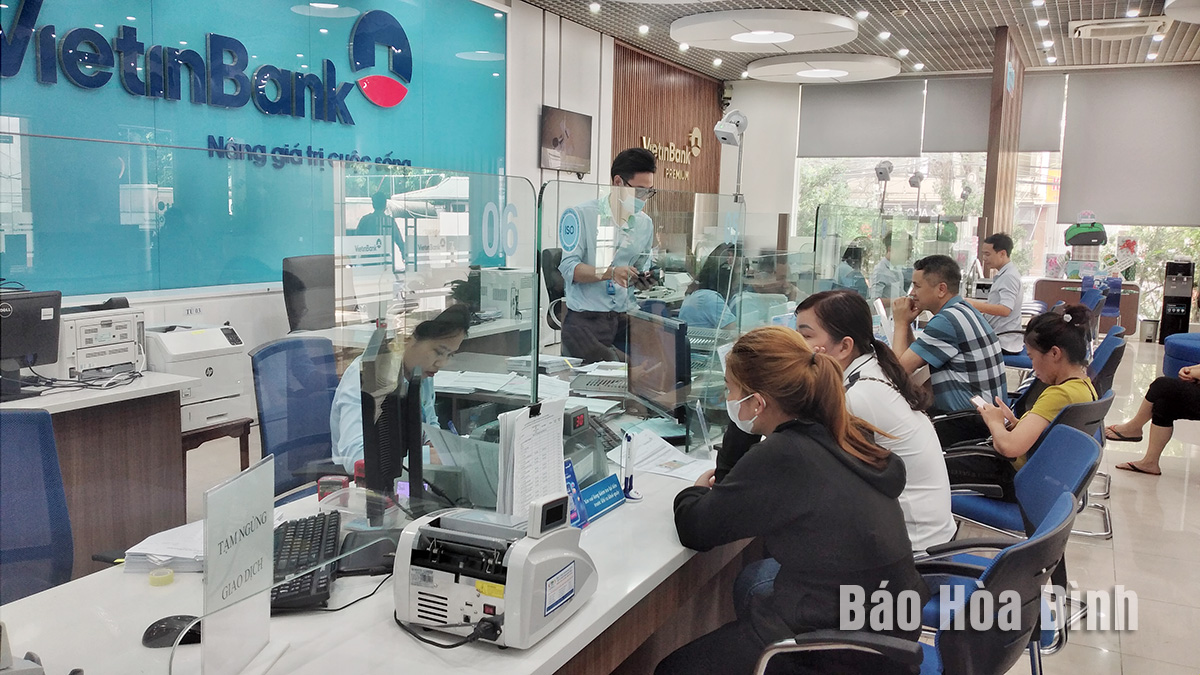
Numerous credit solutions have been implemented by local banks in Hoa Binh province to support individuals and businesses affected by Typhoon Yagi. These measures include debt rescheduling, providing in-depth financial advice, and offering interest rate reductions based on the extent of damages.

VietinBank has introduced an interest rate reduction programme of up to 2% per annum for customers affected by Typhoon Yagi. This programme applies from the end of September until December 31, 2024).
Agribank has launched a large-scale interest rate reduction
programme for borrowers affected by the typhoon. For existing loans, the bank
is reducing interest rates and waiving overdue interest for a specific period.
New loans will also benefit from reduced interest rates.
Similarly, the Military Commercial joint Stock Bank (MB) has
rolled out support programmes for storm victims, focusing on interest rate
reductions to alleviate financial burdens and aid in recovery efforts.
Customers with loans affected by natural disasters can receive interest rate
cuts of up to 2% based on the severity of damage and financial situation.
The bank has also allocated 7 trillion VND (277 million USD) for
new loans with preferential interest rates to support both individuals and
businesses in their recovery efforts.
To further assist customers, many banks have implemented
additional measures such as loan extensions, restructuring repayment terms, and
providing specialized financial advice. They have also given priority to loan
applications for housing and employment needs, and intensified social welfare
activities to support heavily affected customers.
The State Bank of Vietnam's branch in Hoa Binh has reported that
banks and credit institutions in the province have actively implemented credit
programmes to support storm victims. In line with government directives, banks
have proactively identified customers in need of debt restructuring and
provided guidance on procedures.
As of October 9, 2024, 78 customers in Hoa Binh with a total
outstanding debt of over 6.7 billion VND had reported damage by Typhoon Yagi.
The support measures implemented include debt restructuring for 3 customers,
interest waivers for 72 customers, new loans for 3 customers, and interest rate
reductions worth approximately 800 million VND.
Since the beginning of this year, under the direction of the Department of Agriculture and Environment, the Sub-Department of Agricultural, Forestry, and Fishery Product Quality Management has strengthened the integration of the professional activities to promote and guide the organizations and individuals in the production and trading of agricultural, forestry, and fishery products to comply with the legal regulations regarding the use of chemicals, pesticides and veterinary medicines in crop cultivation, livestock farming and aquaculture. They also provide guidance to processing and manufacturing establishments on keeping the records to trace the product origins and using food additives from the approved list according to the regulations.
Hoa Binh province saw a significant rise in state budget revenue in the first two months of 2025, heard a meeting chaired by Vice Chairman of the provincial People’s Committee Quach Tat Liem.
Ha Thi Ha Chi, a 26-year-old graduate in law, has taken an unconventional path by returning to her hometown in Mai Chau district to establish the Tong Dau Cooperative, creating stable jobs for local women and bringing Thai ethnic brocade weaving to the global market.
As the Lunar New Year 2025 approached, pork prices surged, creating a profitable season for farmers in Tan Vinh commune, Luong Son district. Taking advantage of the rising demand, Can Minh Son, a farmer from Coi hamlet, sold over 30 pigs at 69,000 VND/kg, each weighing more than 100 kg. After deducting expenses, his family earned a profit of over 50 million VND.
alternate member of the Central Party Committee, Secretary of the Hoa Binh provincial Party Committee Nguyen Phi Long on March 5 had a working session with Yan Jiehe, Founder and Chairman of the China Pacific Construction Group, one of China's largest private corporations in the field of transport infrastructure. Deputy Secretary of the provincial Party Committee, Chairman of the provincial People's Committee Bui Duc Hinh and leaders of provincial departments and sectors also attended the working session.
The electronic printed circuit board (PCB) manufacturing and processing plant of Japan’s Meiko Group, located at Da River Left Bank Industrial Park in Hoa Binh city with a total investment of over 200 million USD, is expected to create thousands of jobs and make a significant contribution to the local budget.



